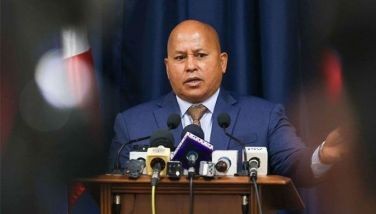Comelec: 2010 poll automation still on
MANILA, Philippines - Poll automation in 2010 would push through even with the disqualification of firms bidding to provide automated counting machines (ACMs), the Commission on Elections (Comelec) said yesterday.
Comelec Chairman Jose Melo junked calls to consider partial automation or use P1.2 billion worth of ACMs purchased from the controversial Mega Pacific Consortium (MPC) for the 2004 elections.
Due to various documentary deficiencies, the Comelec last week rejected the bids of all seven foreign and local bidders to supply machines for the automated elections.
Melo said the Comelec has not yet declared a failure of bidding and that there is still time for full automation.
“We have not yet reached a situation where we would opt for partial automation. We have yet to declare a failed bidding,” he said.
Melo said the poll body would only opt for partial automation if the winning bidder would tell them that they do not have the time to produce the necessary 80,000 automated machines.
Lawyer Romulo Macalintal, election counsel of President Arroyo, yesterday suggested to the Comelec to consider using the ACMs purchased from the MPC in its pursuit of automation of the 2010 general polls.
“This is the time for the Comelec to ask the Supreme Court to set aside all legal technicalities and yield to what is practical and economically viable under the present crisis where the much awaited poll automation is in peril. This is the best remedy to answer the call to start even a partial poll automation in our country,” he said in a statement sent to The STAR.
The Supreme Court (SC) stopped the use of the 1,991 ACMs bought from the MPC in 2004 only on the ground that they were “illegally procured and improvidently paid by the Comelec,” he said.
Reliability never questioned
Macalintal said the reliability and accuracy of the machines were never questioned.
In fact, the Department of Science and Technology even certified that the ACMs of MPC were “100 percent accurate and can be used to automate the counting and canvassing of votes in the 2007 elections,” he said.
On July 24, 2006, Science and Technology Secretary Estrella Alabastro submitted to the Office of the Ombudsman a report stating, among others, that these ACMs “exhibited 100 percent accuracy rating in continuously counting a total of 440,000 votes for a period of 14 hours.”
Alabastro said she was willing to stake her reputation in attesting to the reliability and accuracy of the counting machines.
Macalintal said he then asked the SC to allow the use of the ACMs for the 2007 mid-term polls, but the High Court denied his petition due to the pending criminal cases then against some officials of the Comelec and MPC before the Ombudsman and the civil case filed by the Office of the Solicitor General against MPC before the Makati City regional trial court to recover the P1.2 billion from the consortium.
Macalintal said this is no longer the case today.
“As we all know, nothing happened to the criminal cases as (these) were all dismissed by the Ombudsman for lack of evidence to prove the guilt of the Comelec officials and officials of the MPC. As to the civil case to recover the P1.2 billion from the MPC, the government is not even sure of winning this case,” he said.
“It seems it’s going nowhere considering the length of time it will take the court to decide the case. Any aggrieved party will even seek remedy before the Court of Appeals and then the Supreme Court, all of which may take 10 years to decide,” he added.
Macalintal said waiting for the resolution of the cases involving supposed anomalies in the purchase of the ACMs from MPC would only make the machines futile.
“By that time, these 1,991 ACMs will become totally obsolete or will be fully deteriorated. In the meantime, we lost P1.2 billion and at the same time the Comelec, since 2004 up to the present, continues to pay the amount of P3.9 million as storage fees for keeping them at the Maxilite warehouse. This is indeed ridiculous, if not highly frivolous, as the government continues to spend P3.9 million for storage fees of 1,991 ACMs which we cannot even use for the purpose for which they were purchased,” he lamented.
Macalintal appealed to the government to take a “practical and equitable” move by making use of the 1,991 ACMs.
He said it is too late for the Comelec to purchase new automated machines at this point.
He said that even if qualified bidders come up, the poll body does not have ample time to set up necessary programs and training to use the newly acquired automated machines next year.
“To reiterate, there is nothing wrong with these machines. Only legal technicalities made them wrong. Now is the time to rectify this wrong and at the same time prevent another wrong in the offing if the government would still insist on spending P11.3 billion for the 2010 automated polls when all starting bidders were already disqualified,” he said.
But Melo said the poll is prohibited from using the P1.2 billion ACMs.
“It’s not possible because as per Supreme Court’s order, the Comelec cannot use or touch the mega pacific machines,” Melo said, adding that the case is still pending before the court.
Open election system
Meanwhile, National Security Adviser Norberto Gonzales has another suggestion to the Comelec on how it could implement automated polls in 2010 even after the bidding for computerized machines to be used in balloting failed last week.
Gonzales said the Comelec should seriously consider the “open election system (OES),” the poll automation scheme proposed by former election chief Christian Monsod that the national security chief described as “simpler, much easier to implement but much more transparent, more fraud-proof and just as speedy” and backed by many Catholic bishops.
“Reverting to manual elections next year is now a distinct possibility that we cannot allow to happen. It would be disastrous for the country to have a 2010 presidential election with questionable credibility,” Gonzales said.
“We are running out of time for the preparation for full automation, but we still have adequate time for OES,” he said.
Gonzales said the “sorry status of the bidding process for the country’s poll automation contract only shows the great risks involved in the giant leap from manual voting to full automation that the Comelec wants the country to make.”
He said many of the country’s poll computerization experts are greatly concerned about the Comelec’s ability to implement fully automated elections in 2010 given its lack of experience and its present deficiencies in information technology.
The OES retains manual voting and precinct-level counting but automates the canvass process. It is designed to keep the transparency of manual voting and precinct-level counting but at the same time address vote padding, which occurs at the canvassing for national elections, he said.
Gonzales said the system, halfway between manual and fully automated elections, is more fit to the present readiness not only of the Comelec but more so of the country’s electorate, particularly the elderly, most of whom have not touched a computer.
The proponents of OES have also pointed out that the government can save at least P7 billion from the P11.3-billion approved supplemental budget for full automation of the 2010 elections if the Comelec opts to adopt OES instead, he said. – With Edu Punay, Paolo Romero
- Latest
- Trending

































